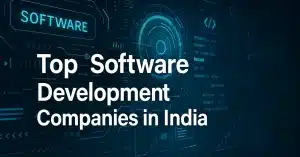The software development industry is painting the future picture at the speed of thought, influenced by technology and market demands. This indicates that developers, companies, and people interested in the trends in this field have to strive for them.
Let’s examine the significance of software development services and development trends that will define the future of software solutions in this blog.
Top Software Development Trends to Consider
AI-Driven Development
Al has impacted almost all industries, and the same applies to software development solutions. Some of the examples of the usage of AI in software development include the GPT-based models, intelligent automation, which makes coding fast, bug detection, and, in most cases, the writing of test cases. AI-based development also improves the prospects of the undertaking and helps developers target more important tasks.
Why It Matters: Due to its ability to advance development speed, enhance accuracy, or cut the time for debugging, AI becomes crucial to teams that are striving for more efficient operations.
Low Code and No Code Development
Traditional and even low-code no-code platforms are now assisting those who are not developers to develop pieces of software by just dragging and dropping tools. Such platforms assist in rapidly prototyping and delivering applications with limited need for expensive infrastructure investment.
Why It Matters: The characteristics of low-code and no-code platforms will become more popular and relevant as software development services will not require much tech skill and knowledge.
DevOps and GitOps
DevOps is a set of practices that has dominantly been practiced in custom software development services lately, and GitOps is the next step to it. GitOps combines DevOps with Git source control and lets one manage infrastructures using pull requests.
Why It Matters: Due to the automation and collaboration that comes with GitOps, code gets deployed much faster, and hence the time to get products to the market is greatly reduced.
Blockchain Beyond Cryptocurrencies
Blockchain is not just restricted to being an application for cryptocurrencies anymore. It will be implemented in supply chain, healthcare and finance industries since the technology offers decentralized systems with high transparency and security.
Why It Matters: Diligent records that information stored on the blockchain is secure and cannot be changed will revolutionize industries, establishing more transparent and reliable systems.
Edge Computing
It is a method that processes data locally, i.e closer to the source, rather than relying on centralized cloud processing. This trend is starting to take shape in environments where the processing of bidirectional streaming data is the primary requirement, for example, self-driving cars, IoT, Smart Cities, etc.
Why It Matters: With IoT and real-time applications evolving, edge computing will only remain as a solution and a key requirement for developers seeking to optimize on the backend in the future.
Cloud-Native Development
Cloud-native development is a process of creating applications that are custom built to be deployed and executed in cloud environments. All these applications employ microservices, Kubernetes, and serverless models, which is a feature that native development cannot afford.
Why It Matters: The prevalent design will be cloud-native to help businesses grow and manage them and to help manage applications.
Cybersecurity-Driven Development
And cybersecurity-driven development is a trend because of cyberattacks, which occurred, becoming the basis for building security into software development. In its virtues, it is an effective prevention model for securing applications, starting right from the code implementation level right up to incorporating security in development.
Why It Matters: There are more threats in cyberspace day by day; developers need to learn about security to build a more secure application.
Progressive Web Apps (PWAs)
PWAs have features of both web and mobile apps, can work offline, load faster, and are mobile-friendly. Mobile PWAs have become favorites of many citizens as they offer a native app like experience without having to install from the app store.
Why It Matters: Businesses will increasingly adopt PWAs as a cost-effective and user-friendly alternative to traditional mobile apps.
Quantum Computing in Development
Quantum computing can transform how software is made. But it can also work on numerical problems that classical computers have a hard time cracking, such as cryptography and simulations of molecular structures, and it does so much faster and more effectively.
Why It Matters: Examining the role of quantum computing as it transitions from a research domain into a business setting, developers have to pay attention to its influence, particularly where it concerns cybersecurity.
Augmented reality and Virtual reality
Augmented reality and virtual reality are increasingly being adopted with certain industries, including gaming, education, retail, and healthcare. To cite but a few examples, virtual worlds are gradually developing from gaming platforms to an important avenue for creating the extra to applications of augmented reality to training and maintenance. These technologies are defining new conditions of interaction with the user.
Why It Matters: Due to the trending use of indoor entertainment, 3D gaming experiences, and so on, AR and VR program development is something that cannot be ignored as pertains to program development.
Multi-Experience Development
Multi-experience development is the process of developing applications, that assimilate the web, mobile, desktop, wearable, and others. This trend is emerging because the users want to be able to use applications from the different devices without compromise.
Why It Matters: Application developers have to create mobile apps that provide similar performance and look on different platforms.
Internet of Things (IoT)
The phenomenon of IoT is further growing with the increased connectivity of devices. Software engineers must now concentrate on building applications that can manage, analyze, and interact with the tremendous amount of data produced by connected objects, from home automation devices to industrial IoT over the network.
Why It Matters: With increasing IoT deployment, software that augments data retrieved from IoT devices will play a vital role in decision support and control.
Ethical AI and Responsible Tech Development
Another trend is the increasing number of ethical and fair issues that arise in relation to increasing AI usage. Software engineers should step up their efforts and produce AI systems that are free from bias, more open, and explainable, not excluding ethical values in information technology.
Why It Matters: Ethical AI development will be critical to avoid biased algorithms, ensure privacy, and build trust in AI systems.
Also Read : Why Custom Software Development Matters for Robust Industry
Cross-Platform Development
Tools that are available in the form of cross-platform include Flutter and React Native because they enable developers to code a similar application for both Android and iOS. This has the benefits of shortening the development time and costs of building and still results in high performance and design uniformity.
Why It Matters: Development across platforms will also continue as companies will continue to look for methods of reaching several platforms simultaneously without having to create content from scratch.
API-First Development
API first development deals primarily with designing systems around APIs. When focusing on APIs, the developers can build applications as a combination of independent and interchangeable components that can be adjusted when cooperation with other services or further extensions is planned.
Why It Matters: The evolution towards open systems and a focus on integration and interoperability will make sure that API-first will remain adaptable and agile in the long term.
AI-Powered Testing
AI is already beginning to take over much of the process of software testing, including bug identification, test re-running, and performance enhancement. Some limitations of the development include AI tools provide the ability to quickly find problems and create testing scenarios, which will significantly reduce the time for testing.
Why It Matters: Implementing artificial intelligence into the testing process will enhance the quality of software as well as decrease the numerous mistakes and, most importantly, decrease time spent on the testing phase, making it an essential component to any today’s development team.
Also Read : Benefits of Using Custom Software Development Solutions for Your Enterprise
Software Supply Chain Security
When it comes to dependencies, the third-party components and libraries have become a primary concern of securing the software delivery chain. This is required so any external components as well as dependencies are not delivered with any vulnerabilities that the developers may have missed.
Why It Matters: Known instances such as the supply chain attack by SolarWinds underline the importance of improved security in every stage of software development.
AI-Powered Testing
There has been an increase in the usage of open-source software since the realization of the benefits associated with using open-source products. Extensive discussions reveal that open-source projects encourage participation and creativity in project development, thus arriving at better solutions due to diversified ideas.
Why It Matters: Businesses shall find open-source tools and platforms to be more effective and new age in the coming years.
Human-Centered Design and UX/UI Best Practices
Human-oriented design targets the application of interfaces that are usable, easy to use, and, when necessary, adapted for the user. UX/UI trends that will be more marked include simplicity, inclusiveness, and enhanced usability, hence a better user experience.
Why It Matters: As the market becomes saturated, creating an easy-to-use UI for software products will help separate successful products from mediocre ones.
Also Read : 8 Key Benefits of Software Development Consulting Services
Open Source and Community-Driven Development
When developers have access to 5G Internet, they’ll be able to create programs for the ever-growing Internet of Things. Augmented reality, virtual reality, and real-time communication are all possible due to the low latency and high speed that 5G will provide.
Why It Matters: New possibilities for evolution in various fields will appear as 5G will provide data-intensive applications and real-time interactions.
Concluding Thoughts
Ahead of the year, the software development services industry will face lots of transformations with the help of advanced technologies. These include artificial intelligence, blockchain, and quantum computing. Managing such trends is crucial for organizations and developers seeking to develop appropriate, hardy, creative, and integrated software solutions.
Ethical AI, cloud-native application development, and more are the trends that are going to transform the future of software and the way it is developed, tested, and deployed. It means embracing these trends to remain relevant and develop solutions that can make a difference within the constantly changing digital environment.









